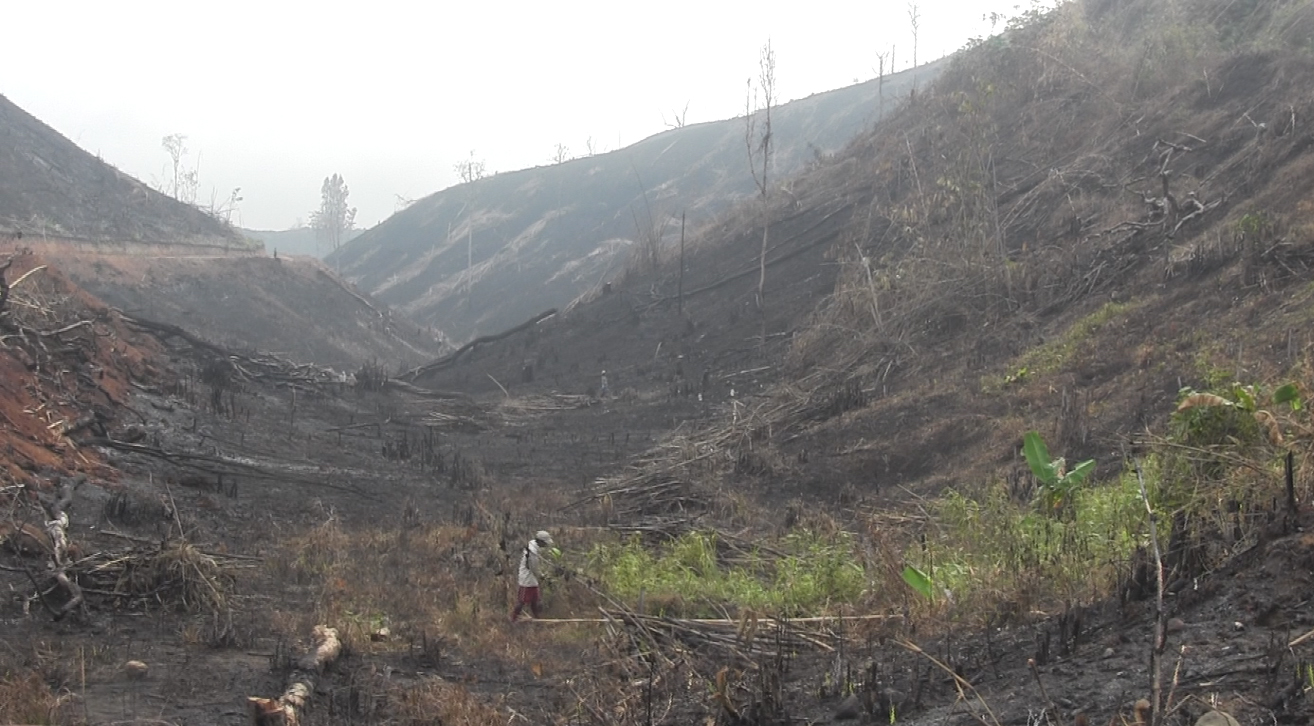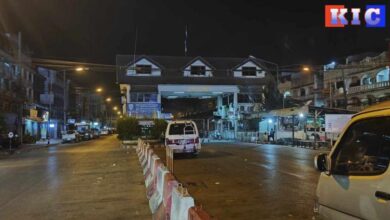Villagers, the big losers as land is ‘grabbed’ for development

Driving through the rural roads of the Tenasserim (Tanintharyi) region in Southern Burma, vast plantation of palm oil and rubber trees stretch on either side of the roads.
Signboards along the roads and in the town proclaim that, ‘Tanintharyi Division is the Oil Bowl of Myanmar’.
Government policy to use vast tracts of farmland and forests for rubber and palm oil is now under scrutiny and has raised many questions by villagers and environmental groups.
Villagers say government policy for contract and industrial farming has a dark side – land grabbing, death threat, displacement and poverty.
Noh Pa Doh village in Palauk Township, Tenasserim (Tanintharyi) Division is a Karen village that has been taken over by a large commercial rubber plantation project.
The villagers were forcibly relocated by the former Burma military regime. Villagers alleged that the Burma Army division commanders forcibly relocated villagers and re-sold their confiscated land and plantations to a Burmese businessman, U Hla Than, the owner of Pyi Pho Htun International Co Ltd.
Naw Htoo Na, a Karen villager from Noh Pa Doh explained to Karen News.
“Since losing our land we face great difficulties surviving. Education for young people in Noh Pa Doh village is declining. There is less food. There is also less land for us to live on. Our village cannot develop. Our children can no longer go to high school. This was caused when we lost all our land and plantations, we cannot afford to send them to school. We don’t have land or plantations to grow crops on anymore, so we are now facing poverty.”
In the part upper of Noh Pa Doh village, 44 residents had their land illegally seized, resulting in the loss of up to 1,500 acres according to data collected by the villagers.
The State Agriculture Department records show that in January 2010, 216 companies received a total of 1.75 million acres (708,200 hectares) of farmland in the form of state concessions.
Villagers and human rights have documented that under the former military regime, land grabbing was a widespread, systematic practice. Government bodies, particularly military units, seize large tracts of farmland usually without paying compensation. A significant proportion of this land grabbing took place in ethnic states.
Saw Albert the field director of the Karen Human Rights Group, told Karen News.
“Land confiscation is widespread in Burma. It is taking place in every district of Karen State. The previous [military] regime conducted land confiscation. They confiscated the land for their military bases, and took villagers’ farmland to carry out economic projects.”
Saw Albert points out that land grabbing under the military backed civilian government of President Thein Sein the practice is still wide spread.
“Since the new government was elected in the 2010, land-grabs are being carried out by companies, as more business and investment come in. Companies get grants [from the government] and then come to the local areas. But these areas that have been granted include village lands, villagers’ farmland and land used by villagers to make their livelihoods. When the companies come, they tell villagers that they bought the land from the government. Then they ask the villagers to leave. This is why the land confiscation problem is ongoing.”
The Washington based Centre for Strategic and International Studies in a report on its website said.
“It is estimated that approximately 1.9 million acres were illegally transferred to private companies in the past 20 years, even though 70 percent of that land has never been developed and is still used for farming by the original owners.”
The land has been taken for commercial agriculture projects, either run by the military or by companies with ties to the military. Some land is also leased to foreign companies, who have ties with many of these Burmese companies.
Under military rule, farmers say that they knew that it was hopeless to challenge these land seizures. Any protest would result in a lengthy prison sentence, in some cases those who challenged the government simply disappeared, or, as happened in ethnic areas, protesters had been executed.
Saw Htoo Gay from Noh Pa Doh village spoke to Karen News.
“A company came with Burma [Army] soldiers and threatened us. They came with the local authorities and a village headman with their militia. They came and threatened us in many ways, so we had no choice, but to give up our land.”
Naw Htoo Na said she was threatened with jail if she did not leave her land.
“They (company) threatened us and told us that we cannot sell our land to other people. If we sell it they will put us in prison. They said we don’t own this land, and that it belongs to the government and the [Burma Army] Division Commander.”
The result of this land grabbing is greater displacement among Burma’s rural population. It has increased rural poverty and driven villagers to take risks and seek to work illegally in Thailand.
Naw Htoo Na explained.
“Now we don’t have our land or our homes. We have to live on a small piece of land belonging to our neighbour. We are scattered everywhere. Some of us make bamboo walls to sell, some of us labour in the company’s rubber plantation. Some people have to leave to work in other villages. Some of our children left their homes to go looking for work in Thailand. We don’t even know where they are.”
Saw Htoo Gay said.
“Some people have to labour in the companies’ plantations – women and men alike. We don’t have our own plantation anymore that we can earn money from to send our children to school. We lost our land and our plantations.”
Saw Albert from the Karen Human Rights Group said.
“Land confiscation results in poverty, as local land that was used for earning livelihoods disappears. Once that happens villages disappear as well. In addition, it contributes to the decline in health and education in ethnic areas.”
Under Burma’s 2008 constitution, the state remains the ultimate owner of all land and natural resources in the country. Land rights are given in the form of either leasehold rights, user rights, or the right to cultivate a certain plot of land.
Saw Albert said.
“The current government’s land law does not protect the people. For example, land that is not currently being used for farming or cultivation is recognized as vacant land by the government, so they can take it anytime they want. Karen people are traditionally rotation farmers. They rotate their crops every year. However, when they move to a new farm, according to the law, their previous year’s farm becomes vacant. The process for villagers to get a land grant takes too long and is complicated and expensive for them.”
Environmental groups say that the two new land laws were passed in 2012 – the Farmland Law and the Vacant, Fallow, and Virgin Land Management Law give them little or no protection. These laws were intended to clarify ownership under the constitution and provide protection to land leaseholders guaranteeing more rights of ownership. To date, the only ones continuing to profit from this new law will be big business and government interests.




